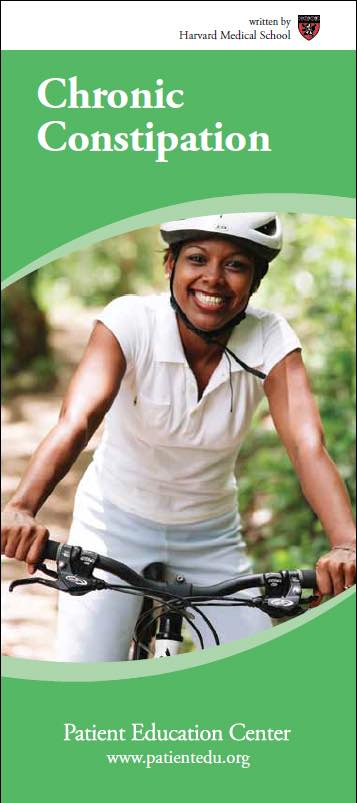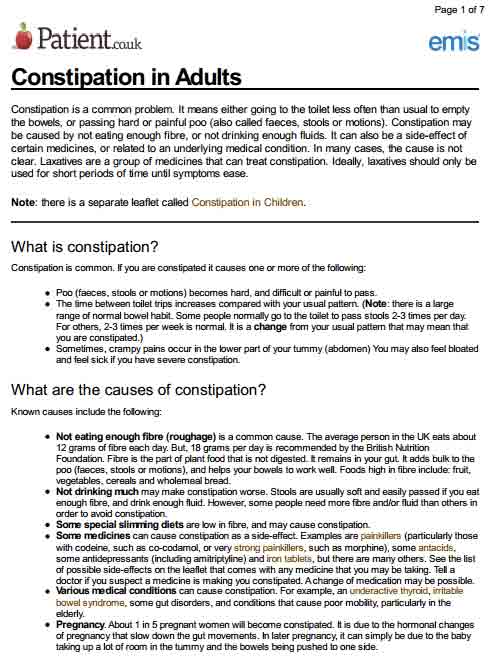You can now add Healthify as a preferred source on Google. Click here to see us when you search Google.
Medicines and constipation
How to treat constipation caused by your medications
Key points about medicines and constipation
- Some medicines can cause constipation, making you go to the toilet less often than usual to empty your bowels (poo) or pass hard, painful poos.
- Medicines known to cause constipation include clozapine, opioids (morphine, codeine, oxycodone, tramadol) and iron tablets.
- If constipation it is not treated it can cause tummy pain, cramping and bloating or serious, life-threatening gut problems that need to be treated as an emergency in hospital.
- Talk to your doctor, nurse or pharmacist if you are concerned that your medicine is making you constipated.

Not all constipation is caused by medicines, so working out if your symptoms are caused by your medicine is not always easy. If you have noticed a change in bowel movements when you started a new medicine or when you increased the dose of a medicine you were already taking, it could be because of your medicine. Symptoms of constipation include:
- passing hard, dry poos
- not getting the urge to go as often as before
- having to push really hard when you go
- feeling like you don't get everything out.
Medicines can cause constipation in different ways, such as by affecting the muscles in your gut, affecting your nervous system, which in turn affects your gut muscles, or by causing dehydration. The following are examples of medicines that can cause constipation, especially if taken in higher doses.
| Examples of medicines that commonly cause constipation | |
Note: This is not a complete list. If you have constipation or are unsure whether the medicine you are taking can cause constipation, ask your doctor or pharmacist for advice. |
Over-the-counter products such as antacids, antihistamines and paracetamol can cause constipation. Complementary and alternative medicines may also cause constipation. Combinations of any of the above medicines can increase your risk of constipation.
Using too many laxatives
Using too many laxatives and enemas can cause 'rebound' constipation. If you use laxatives too often, your body may rely on them to pass poos. Heavy use of laxatives can also cause runny poos. For the same reason, if you use enemas too often, your body may begin to depend on them. Too many enemas may stop you from having normal bowel movements. Read more about laxatives.
You are at increased risk of being constipated if you take any of the medicines listed above. You may be at greater risk of being constipated if you also have a low-fibre diet, aren't getting enough regular exercise or have an illness that affect your nervous system, such as Parkinson's disease, stroke or dementia. Some medical conditions such as diabetes and hypothyroidism (low thyroid) can increase your risk of constipation.
Constipation is more common in older people mainly because they are often taking lots of medicines, are more likely to be dehydrated, have less exercise and may not have enough fibre in their diet.
If you are in hospital or have just been in hospital
If you are in hospital or have just been in hospital you are at risk of constipation due to changes in diet and less exercise, and you may have started or been given new medicines. If you have just had surgery, it may take a few days for your bowel movements to return to normal.
If you notice changes in your bowel movements while you are in hospital, talk to your nurse or doctor. If you have problems after you go home, talk to your doctor or pharmacist.
It is important to treat constipation. If it is not treated it can cause tummy pain, cramping and bloating. Straining when passing poos can cause haemorrhoids, anal fissures (tears) and bleeding. In severe cases, constipation can cause faecal impaction and serious, life-threatening gut problems that need to be treated as an emergency in hospital. Here are some ways you can prevent and treat constipation.
Add foods with more fibre to your diet
At breakfast, high-fibre options include porridge, muesli, bran, wheatgerm, nuts and seeds. Many fruits and vegetables are also high in fibre, especially if the skin is left on. Wholegrain versions of breads, cereals, rice and pasta are best. Adding chickpeas, kidney beans or lentils is a good way to increase fibre in your meals. When baking, white flour can often be mixed with wholemeal flour.
Fruits and juices high in sorbitol (a type of sugar) can help with constipation. These include apples, apricots, grapes and raisins, peaches, pears, plums and prunes, raspberries and strawberries. Kiwifruit may also improve the symptoms of constipation.
Make sure you drink enough water
Aim for a fluid intake of at least 1.5–2 litres (6–8 glasses) per day. If you have heart failure or advanced chronic kidney disease check with your doctor about how much fluid you can have.
Keep active and exercise regularly
Being active and doing exercise helps to stimulate the natural movement of your gut muscles that move stools out.
Talk to your doctor or pharmacist if you are concerned
Some people find it difficult to talk about constipation with their doctor or pharmacist. However, they are used to talking about bowel movements, so it's okay to ask, 'could the medicine I am taking cause constipation?' They will check your medicines and may recommend that you use a laxative to ease your symptoms or try a different medicine.
Resources
Chronic constipation [PDF, 470 KB] Harvard Medical Center, US, 2012
Constipaton in adults(external link)(external link) Patient, UK, 2013
5 questions to ask about your medications(external link) Health Quality and Safety Commission, NZ, 2019 English(external link), te reo Māori(external link)
References
Brochures

Harvard Medical Center, US, 2012

Patient, UK, 2013

Medicines and side effects
Healthify He Puna Waiora, NZ, 2024
Credits: Sandra Ponen, Pharmacist, Healthify He Puna Waiora. Healthify is brought to you by Health Navigator Charitable Trust.
Reviewed by: Angela Lambie, Pharmacist, Auckland
Last reviewed:
Page last updated:





